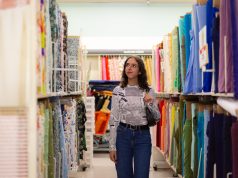HistoryMiami Museum presented the “Queer Miami” exhibition, looking at 100 years of the LGBTQ community’s history in Miami, on Thursday evening.
The exhibit, which opened in March, honors the 50th anniversary of the Stonewall riots and displayed books, magazines, pictures, movie clips and interviews. Displayed chronologically, the exhibit shows the struggles, discrimination, fights and criminalization that the LGBTQ community in Miami faced in the last century.
It was curated by Julio Capo Jr., a writer and professor of the University of Massachusetts-Amherst. Capo, who was born and raised in Miami, said it was difficult to build the exhibit because it was history that it was never meant to be preserved.
“It was really difficult to recover the voice of people that the state never established as important,” said Capo, who has been working on this project for the last 15 years. “It is a community effort, and it is possible because people are willing to share their stories and willing to share their experiences”
For Capo, Miami is a seriously understudied city and it does not get the credit it deserves.
“Miami represents a lot of things,” said Capo. “Immigration, Latinos, people of color, African-Americans. It comes together in every city but in a very different way in Miami because [it] is not just a U.S. city, [it] is a city of the Americas and people don’t tell the history right.”
Capo also said that issues Miami faces overall are the same issues facing the LGBTQ community.
“Immigration is a queer issue. Incarceration is a queer issue. Health care is a queer issue,” he said. “I hope this exhibition expands our ideas of where the movement is today and where it should go.”
Museum Marketing Director Michele Reese said the idea for the project came from Capo after he wrote his book “Welcome to Fairyland: Queer Miami Before 1940.”
“We are a Miami museum and we tell Miami’s story,” said Reese. “That’s why it such an important story to tell and to understand the history of the community, one that is not told a lot.”
The exhibit includes tales like the Ku Klux Klan raid on the La Paloma gay club in 1937; the marriage of Charlotte McLeod, a transgender woman, in 1959; and the Mariel Boatlift in 1980, when many queer Cuban refugees arrived in the U.S.
“This is an amazing opportunity for everyone in South Florida and across the United States to kind of come together during Pride Month,” said Reese. “And to really take a moment to reflect on the struggle of the LGBTQ community has dealt with for so many years.”
June was chosen as Pride Month to pay tribute to the Stonewall riots, which occurred in June 1969. The riots, at the Stonewall Inn in New York City, are widely viewed as having started the movement for LGBT rights in the U.S.
According to Reese and Capo, the exhibition has been well received and has been the subject of significant media attention.
“I received so many notes and emails, from people saying what it means to them,” said Capo. “There’s something really powerful in saying, ‘Hey we are here, we matter, our story and history cannot be erased.’ ”
“It was an excellent presentation” said Richard De Aguero, one of the attendees. “It is important because we need to know our history. Whether we live right or wrong makes no difference; let’s not make the same mistakes we did before and ignore a segment of the population. We must accept everyone.”
Teru Munro, another guest, said it was a powerful and progressive presentation.
“It’s a lot of good content they have, videos, documents and pictures,” she said. “I can imagine this in a more permanent location because is such an important part of our history.”
Capo, who will be joining FIU as a professor next August, said there’s a lot of work to be done for the community.
“These are issues that still affect the LGBTQ community in disproportionate numbers,” he said, referring to health care, citizenship and affordable housing. “The story is not over, the struggle is not over, people need to continue that fight.”
The exhibition will be open until Sept. 1 at 101 W Flagler St. The admission fee is $10.

































